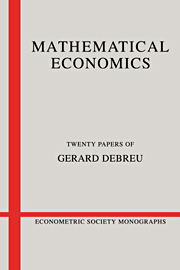Book contents
- Frontmatter
- Introduction
- 1 The coefficient of resource utilization
- 2 A social equilibrium existence theorem
- 3 A classical tax-subsidy problem
- 4 Existence of an equilibrium for a competitive economy
- 5 Valuation equilibrium and Pareto optimum
- 6 Representation of a preference ordering by a numerical function
- 7 Market equilibrium
- 8 Economics under uncertainty
- 9 Topological methods in cardinal utility theory
- 10 New concepts and techniques for equilibrium analysis
- 11 A limit theorem on the core of an economy
- 12 Continuity properties of Paretian utility
- 13 Neighboring economic agents
- 14 Economies with a finite set of equilibria
- 15 Smooth preferences
- 16 Excess demand functions
- 17 The rate of convergence of the core of an economy
- 18 Four aspects of the mathematical theory of economic equilibrium
- 19 The application to economics of differential topology and global analysis
- 20 Least concave utility functions
17 - The rate of convergence of the core of an economy
Published online by Cambridge University Press: 05 January 2013
- Frontmatter
- Introduction
- 1 The coefficient of resource utilization
- 2 A social equilibrium existence theorem
- 3 A classical tax-subsidy problem
- 4 Existence of an equilibrium for a competitive economy
- 5 Valuation equilibrium and Pareto optimum
- 6 Representation of a preference ordering by a numerical function
- 7 Market equilibrium
- 8 Economics under uncertainty
- 9 Topological methods in cardinal utility theory
- 10 New concepts and techniques for equilibrium analysis
- 11 A limit theorem on the core of an economy
- 12 Continuity properties of Paretian utility
- 13 Neighboring economic agents
- 14 Economies with a finite set of equilibria
- 15 Smooth preferences
- 16 Excess demand functions
- 17 The rate of convergence of the core of an economy
- 18 Four aspects of the mathematical theory of economic equilibrium
- 19 The application to economics of differential topology and global analysis
- 20 Least concave utility functions
Summary
The core of a finite economy has been shown to converge, as the number of its agents tends to infinity, under conditions of increasing generality in a series of contributions, of which the first, by Edgeworth (1881), studied replicated exchange economies with two commodities and two types of agents, and the latest, by Hildenbrand (1974), considers sequences of finite exchange economies (with a given finite number of commodities) whose distributions on the space of agents' characteristics converge weakly. However, information on the rate of convergence of the core seems to be contained in only two articles. In Shapley and Shubik (1969, section 5) an example is given of an Edgeworth replicated economy whose core converges like the inverse of the number of agents. Recently, Shapley (1975) provided examples of Edgeworth replicated economies whose cores converge arbitrarily slowly, but concluded with the conjecture that for any fixed concave utility functions only a set of initial allocations of measure zero will yield cores that converge more slowly than the inverse of the number of agents. The theorem stated below for replicated economies with arbitrary numbers of commodities, and of types, asserts that such is indeed the case provided that preference relations are of class C2, and satisfy the conditions listed in the definition of the economy. At the same time, the theorem implies that the set of exceptional allocations is closed as well as of measure zero.
- Type
- Chapter
- Information
- Mathematical EconomicsTwenty Papers of Gerard Debreu, pp. 210 - 216Publisher: Cambridge University PressPrint publication year: 1983
- 1
- Cited by



